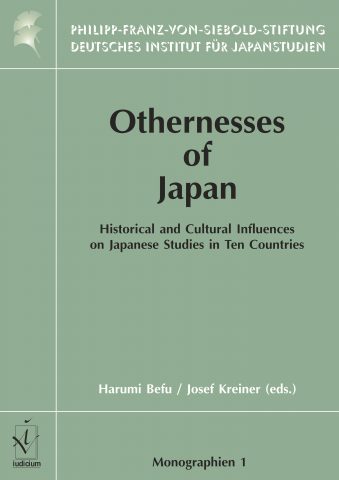
Details
1992, ISBN 3-89129-481-6, € 30,00, iudicium Verlag, Munich, 342 pp., hardcover [Order]Authors
Befu, Harumi
Othernesses of Japan: Historical and Cultural Influences on Japanese Studies in Ten Countries

The first international symposium of the institute was held in 1989 and was dedicated to the fundamental theoretical problem of so-called “national approaches” in Japanese studies. The assumption of the two editors was that the differing cultural backgrounds of researchers in Japanese studies from various countries have decisively influenced, and still influence, their approach and their tradition of research. This assumption was discussed by scholars from nine countries: Germany, Austria, the Netherlands, France, the Soviet Union, the United States, India, and the Republic of Korea. Japanese colleagues familiar with the research tradition in one of these countries gave their comments on the respective contributions. This volume is the first attempt ever made to formulate and analyse this hitherto neglected question.
Content
Specific Features and Approaches in the Study of Japanese Society and Culture in the Soviet School of Orientology
pp. 259-268
Soviet Japanology and Russian Japanology
pp. 269-280
Indian Approaches to Japanese Studies
pp. 281-293
The Indian Approach to Japanese Studies: A Personal Comment
pp. 295-307
Trends in Japanese Studies in South Korea
pp. 309-318
The Style and Background of Japanese Studies in Korea
pp. 319-326
Index
pp. 327-338
Contributors to this Volume
pp. 339-342
National Approaches, Parallel Developments or Schools of Great Masters? - Some Remarks on the History of Japanese Studies in Europe
pp. 37-61
Selected Bibliography for the Years 1965-1990 on the History and Present State of Japanese Studies in Various Countries
pp. 63-70
Traditions and Approaches in Dutch Japanese Studies
pp. 71-103
From Colonialism to Thatcherism: Influences in the Approach of British Anthropologists to the Study of Japan
pp. 105-124
French Approaches to Japanese Studies: On their Links with Intellectual Milieus and Traditions
pp. 125-140
French Japanology as an Objective Contribution to a Post-Modern Paradigm
pp. 141-157
French Approaches to Japanese Studies: Comments on the Papers of Berque and Beillevaire
pp. 159-170
Japanologie and its "Teutonicisms"
pp. 171-185
Japanese Studies in Germany and Austria
pp. 187-200
How „American" Are Studies of Modern Japan Done in the United States?
pp. 201-229
An Historical Review of Japanese Studies by American Anthropologists: The Japanese Viewpoint
pp. 231-240
Japan Through the Eyes of Modern Soviet Scholars
pp. 241-258
Framework of Analysis
pp. 15-35